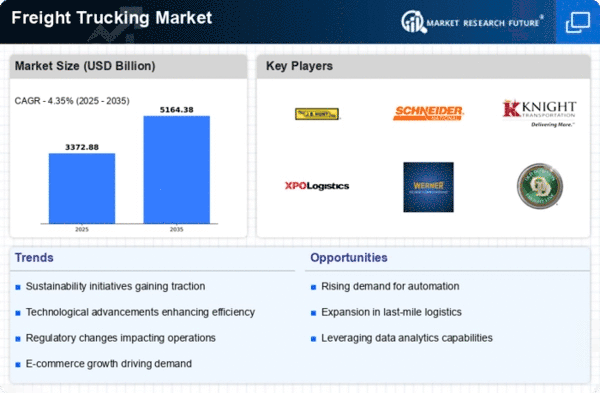Top Industry Leaders in the Freight Trucking Market
 The freight trucking market, the lifeblood of global trade, is a dynamic and fiercely competitive arena. fueled by factors like e-commerce growth, international trade expansion, and technological advancements. This bustling landscape sees established giants like FedEx and UPS clashing with regional powerhouses and agile startups, all vying for a larger share of the cargo pie.
The freight trucking market, the lifeblood of global trade, is a dynamic and fiercely competitive arena. fueled by factors like e-commerce growth, international trade expansion, and technological advancements. This bustling landscape sees established giants like FedEx and UPS clashing with regional powerhouses and agile startups, all vying for a larger share of the cargo pie.
Strategies Adopted by Key Players:
-
Network Expansion and Diversification: Building robust national and international networks, venturing into specialized segments like refrigerated or flatbed trucking, and offering multimodal solutions cater to diverse customer needs. XPO Logistics' extensive network and YRC Worldwide Transportation's focus on niche markets like less-than-truckload (LTL) exemplify this approach. -
Embracing Technology: Investing in telematics, fleet management software, and route optimization tools improves efficiency, reduces costs, and enhances customer visibility. J.B. Hunt's focus on data-driven solutions and JBX Digital's digital freight matching platform showcase this emphasis on technology. -
Strategic Partnerships and Acquisitions: Collaborating with logistics providers, technology companies, and even retailers expands reach, strengthens capabilities, and unlocks new market opportunities. Amazon's acquisitions of freight forwarders and DHL's partnership with Maersk for ocean freight services exemplify this strategy. -
Focus on Sustainability: Implementing green initiatives like electric trucks, alternative fuels, and carbon offset programs resonates with environmentally conscious consumers and businesses. FedEx's electrification plans and Schneider National's focus on renewable energy sources showcase this trend. -
Customer Service and Efficiency: Providing real-time tracking, online ordering platforms, and proactive communication builds trust and enhances customer loyalty. TFI International's customer service initiatives and Old Dominion Freight Line's focus on on-time deliveries exemplify this focus.
Factors Influencing Market Share:
-
Technological Advancements: Advancements in autonomous trucking, drones, and blockchain technology for supply chain transparency create new market opportunities. Companies offering cutting-edge solutions gain an edge. -
Regulatory Landscape: Evolving regulations around emissions standards, driver hours, and trade agreements impact trucking operations and profitability. Adapting to these regulations swiftly is crucial for success. -
Fuel Prices and Operating Costs: Fluctuations in fuel prices and rising labor costs significantly impact profitability. Companies employing cost-saving strategies and hedging against fuel price volatility gain an advantage. -
Regional Growth and Demand: The rise of e-commerce and manufacturing in emerging markets like India and China drives demand for trucking services. Companies with strong regional presence and distribution networks gain an advantage. -
Competition and Consolidation: The market sees fierce competition from both established players and new entrants. Strategic partnerships, acquisitions, and niche market focus can help companies stand out.
List of the Key Companies in the Freight Trucking market include
- Cargo Carriers
- UPS
- FedEx
- Ceva Holdings
- Tuma Transport
- Swift Transport
- Interlogix, Kuehne +Nagel
- Transtech Logistics
- Procet Freight
- Concargo and J&J
Recent Developments:
-
August 2023: XPO Logistics acquires trucking giants GXO Logistics and R.H. Logistics, consolidating its position as a global leader. -
September 2023: The US Department of Transportation announces new regulations aimed at improving truck driver safety and reducing fatigue. -
November 2023: Strong financial performance from major players confirms the freight trucking market's stability and profitability.










